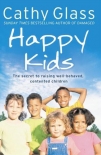Happy Kids by Cathy Glass (best autobiographies to read .txt) 📕

Read free book «Happy Kids by Cathy Glass (best autobiographies to read .txt) 📕» - read online or download for free at americanlibrarybooks.com
- Author: Cathy Glass
Read book online «Happy Kids by Cathy Glass (best autobiographies to read .txt) 📕». Author - Cathy Glass
The pre-teen and early teen stage can so easily become a battleground, with both teen and parents struggling for control and to understand each other. Even the most capable, understanding and loving of parents will experience some disturbance in the household as their children work through this time of change and uncertainty. I like to look upon it as a type of metamorphosis, where the green caterpillar of childhood disappears into the dark and secret cocoon of the teenager, finally to emerge as a beautiful adult butterfly.
Because the child’s body is quickly developing into adulthood, and they are craving more independence, there is a great temptation to assume the child is more mature than they are and therefore give more responsibility for decision making than he or she has the life skills to deal with. However, while they are morphing, children of this age need some very clear guidelines and boundaries. Patience, understanding and firmness are crucial during this time, and into the later teens.
The golden rules for managing pre-teen and early teens
Before looking at the main areas that can give rise to conflict, with suggestions on how to deal with these situations, here are the basic dos and don’ts – the golden rules – for managing pre-teen and early teen behaviour.
Respect privacy Privacy is very important for a child of this age. Respect it, and make sure your son or daughter respects yours. Knock, if their bedroom door is closed, before going in. Don’t read your child’s letters, emails or texts, listen to their phone conversations, spy on them or search their room or bags, unless you have grave concerns for your child’s safety. And don’t give them the third degree every time they return home from seeing their friends – they will resent it. Trust their judgement unless they have given you cause not to.
Hear their views Your child will have a lot of views at this age, about lots of things, and will want to express them, using you and your partner as ‘sounding boards’. Some of what your teen tells you as fact will be absolute nonsense. One teenage girl I fostered announced categorically that she couldn’t wash her hair while she had a period as it would make her ill, while a teenage boy once told me that the earth changed the direction of its rotation every year, with such conviction that I went online and checked. (It doesn’t, of course.)
Listen to what your child says, and always take his or her view seriously. If you know what they are saying is wrong or misguided, gently explain what is generally held to be true, consigning it to someone else if necessary – ‘I heard on the radio that …’ or ‘I was reading an article that said …’
Communicate Keep the pathways of communication open, no matter how difficult it is. When your teen talks to you, a single grunt usually means yes, while a deeper grunt accompanied with a sigh can be taken as no. Ask for your son or daughter’s opinion about anything that might elicit a response – world events, a new dress you’ve bought, the poodle’s new hair cut; and ask about his or her day at school, or evening with a friend, but don’t pry.
Praise Praise your son or daughter, as much if not more than you did when they were young. A drop in self-confidence and poor body image is the blight of many pre-teens and early teens. Praise them each day; even if you have had a bad time (with their seeming to relish confrontation) still find something good to say about them or what they have done. Although they are unlikely to acknowledge your praise, other than with a grunt, they will hear and appreciate it.
Don’t criticise Children of this age are very sensitive to criticism, often seeing and feeling it even where there is none intended. If your child’s behaviour is unacceptable and needs altering, or your child has made a really bad decision, don’t criticise them personally and explode with ‘How stupid can one person be!’ Instead, temper it to ‘I don’t think that was the best option, do you, Tom?’ or ‘Claire, I know you are annoyed, but please don’t speak to me like that.’
Guide Steer your child to the correct decision, and confirm that they got it right with praise and acknowledgment. Children of this age need guidance more than ever; it’s just that they don’t always realise they do. Don’t be tempted to ‘throw in the towel’ and give in – ‘All right! Do it your way then! And you’ll see I’m right!’ If it is something quite minor and safe, like the best method of making shortcrust pastry, then they can be left to get on with it and learn from their mistakes. But if it’s something major that can affect their well-being, then your young teen needs to accept your guidance. Explain why, and use the 3Rs to see it through. Request – ‘Tom, I do not want you using that footpath through the park when you come home from Pete’s. It isn’t safe after dark.’ If Tom persists in this





Comments (0)